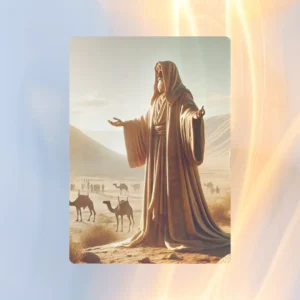The Path of Birur, Free Will, and Rectifying Creation
In Lech Lecha, we encounter a deep concept rooted in Kabbalistic teachings—the idea of birur (refinement or separation). This concept, discussed by Sages and Prophets, involves a spiritual process of sorting or clarifying.
Birur connects to the gift of free will granted by God, a power allowing humans to influence history and reality.
When God created the world, He intentionally left it incomplete, giving humanity free will to choose between good and evil. Humanity’s task is to realize potential holiness in the world, resisting the kelipot (negative forces) that seek to obscure truth and entice people away from the divine.
However, humanity’s first exercise of free will—the sin of Adam—resulted in a profound spiritual flaw. Ever since, efforts to rectify this original sin have shaped history.
This process began with Adam’s sin in the Garden of Eden, where his soul, infused with divine essence, became trapped within the kelipot.
Kelipot are external layers or shells that conceal holiness and represent forces of impurity that seek to ensnare holiness within them.
According to Kabbalistic teachings, Adam’s sin caused his soul to shatter into countless sparks, which have since been scattered and entrapped within the kelipot The redemption of these sparks—called Nitzotzot—is an ongoing process in which each person plays a role. Through Tikkun (rectification), each soul seeks to liberate itself from the kelipot , contributing to the ultimate repair of the world.
Tikkun is the soul’s journey to recognize its entrapment within the kelipah (spiritual impurity) and strive for liberation. Although the kelipah may attempt to convince the soul that it belongs in this state, the soul must intellectually realize its exile and yearn for freedom. Escaping from the kelipah is challenging, as it exerts a powerful grip through impurity and temptation, tempting the soul to remain in a comfort zone rather than pursue truth and alignment with divine will.
This struggle relies on free will; the soul must choose between temporary pleasures and the pursuit of higher truth. Upon demonstrating genuine desire and effort, the soul receives Si’ata Dishmaya divine assistance—as it’s written:
“Open for me an opening as small as the eye of a needle, and I will open for you an opening as wide as a hall.”
From Roots of Impurity to a Path of Spiritual Refinement: Abraham’s Task
“Go forth from your land, birthplace, and father’s house to the land I will show you.”
Abraham’s journey lays the foundation for a new path of spiritual refinement and alignment with Hashem’s Will. He was called to separate from his father, Terah’s idolatrous practices, and follow the path of monotheism.
Abraham’s journey of separation leads to blessing, which occurs in the promised land and is intimately tied to the establishment of a great nation.
The Arizal, through Rabbi Chaim Vital’s Sha’ar HaGilgulim (The Gate of Reincarnations), explains how great spiritual figures can emerge from wicked backgrounds, using Abraham’s lineage from Terah, a high priest of idolatry, as an example.
The Arizal, as explained through Rabbi Chaim Vital’s *Sha’ar HaGilgulim* (The Gate of Reincarnations), highlights that Abraham’s emergence from a background of impurity—being the son of Terah, a devoted idol worshiper—demonstrates a profound spiritual process. The kelipah (forces of impurity) fiercely clings to holy souls, using temptation and sin to maintain its grip and prevent the soul’s pursuit of freedom.
The kelipa seeks to capture the soul by drawing it into sin and connecting it to death and impurity, making escape increasingly difficult. It sustains itself by enticing the person to remain in spiritual complacency, thus strengthening its hold. However, Abraham’s journey illustrates that through genuine effort and divine assistance, the soul can break free from the grip of the kelipa, achieve tikkun (spiritual rectification), and fulfill its divine purpose. By overcoming these spiritual obstacles, Abraham set the foundation for the path of monotheism and spiritual refinement for future generations.
Humanity’s Task
Humanity’s mission is to liberate the soul from the kelipa, which desires to imprison it because the soul’s holiness provides sustenance to these impure forces. However, the soul’s divine connection remains unbreakable, as God decreed that no soul shall be permanently lost.
Humanity’s task is to reclaim and realign the soul with its divine source, thereby dismantling the kelipa’s hold.

